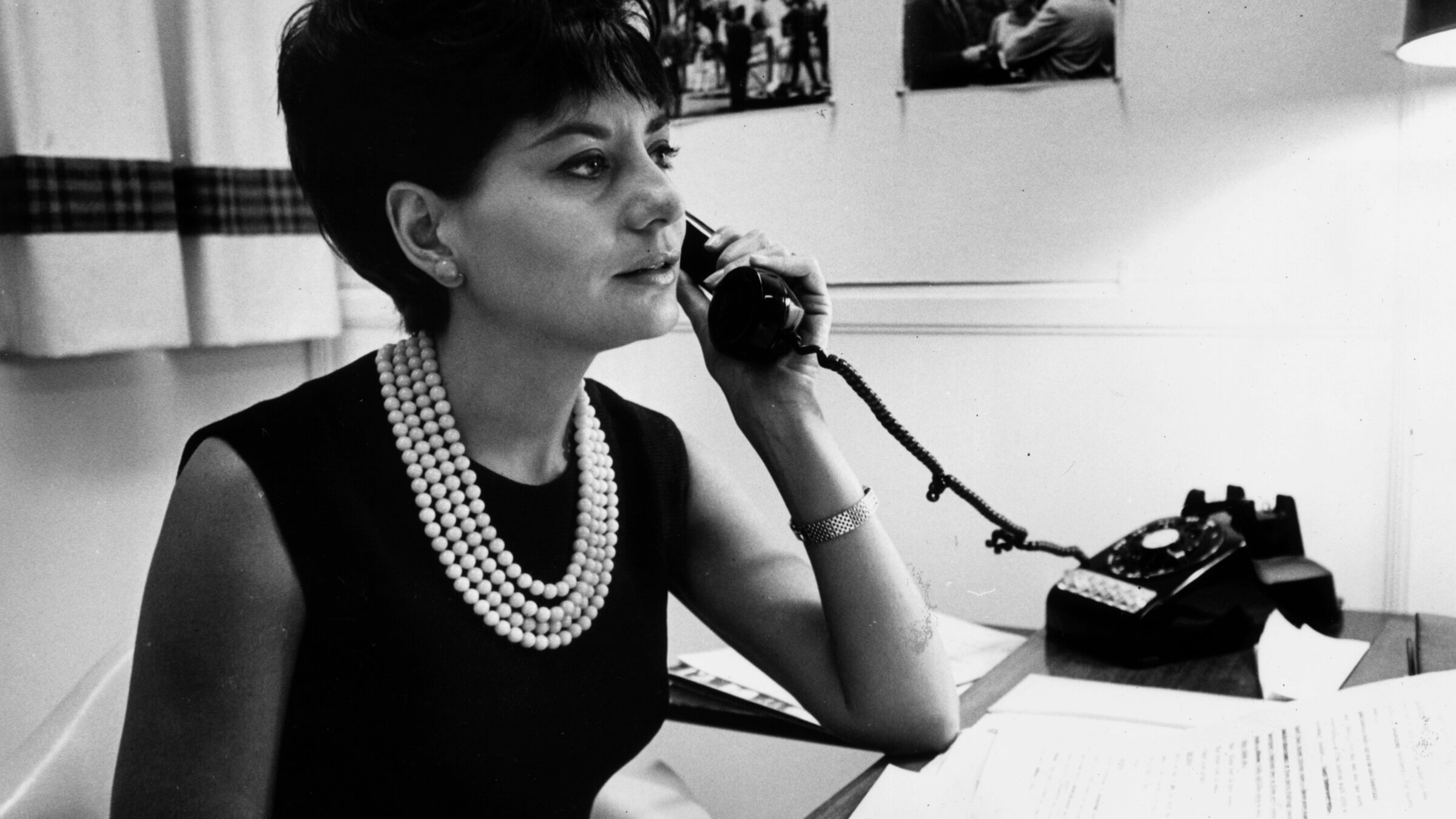How the iconic Barbara Walters led the charge against antisemitism and social injustice (sometimes)
The first Jewish co-host of a news program spoke out against Spiro Agnew’s bigotry, but seemed to give others a pass

Barbara Walters at her NBC desk in 1964.
Barbara Walters, who died Dec. 30, 2022, at the age of 93, has a secure place in history as the first Jewish co-host, as well as first female co-host, of an American TV news program.
The success that accompanied her through the decades in stints for Today, ABC Evening News, 20/20, and The View, was the product of a childhood spent in intermittent fear for her father’s livelihood. Lou Walters (born Louis Abraham Warmwater to a family from Łódź originally named Waremwasser) was a nightclub manager who had extreme career ups and downs.
He owed favors to gangland figures, among them Roy Cohn, the McCarthy-era supervillain portrayed in Tony Kushner’s Angels in America and puppet master to former President Donald Trump.
In a 2008 memoir, Walters revealed that Cohn managed to get an arrest warrant filed against her father dismissed, and her gratitude was such that she dated the closeted Cohn while at college, and remained an ardent friend, even testifying as a character witness in 1986 when Cohn was disbarred for “unethical and unprofessional conduct, including misappropriation of clients’ funds, lying on a bar application, and pressuring a client to amend his will.”
When asked why she remained so close to Cohn, Walters would refer to the number of influential people he knew, his power and effectiveness, and other related pluses.
Jews in American Politics lauded Walters as a “journalist-as-popular culture icon,” while noting that “television does not distinguish between movie stars and political stars.”
In truth, Walters herself often chose not to make the distinction. When meeting public figures, she conveyed personal impressions based on appearance and charm, qualities that might be expected in professional entertainers. Playing along with the supposed charisma of the powerful was a key to her constant access to the mighty.
In an autobiography, Walters recounted a family story that on her deathbed, her grandmother, who had given birth to seven children, claimed to be a virgin. When her family objected, reminding her of all the children, Bubbe insisted, “I know, but I never participated.”
Walters had her critics as well as admirers, but all must admit that through her long career, she always participated.

In a 1970 book, she recounted her experience interviewing then-President Richard Nixon: “I find that he has sex appeal — he’s slim and suntanned and well, he’s just sexy, that’s all. And I call that charming.”
Lest readers simply dismiss this as mere flattery of those in power, biographer Jerry Oppenheimer quoted an unnamed friend of Walters who asserted that the latter was indeed drawn to men who were “dark in temperament, dark in negotiation and maneuvering, dark in manipulation.”
Yet was Walters sincere about Tricky Dick? During an October 2014 public appearance at Harvard, when asked onstage about her impressions of Nixon, she declared: “He seemed to me constipated. He wanted to be liked, he wanted to reach people, and he had no idea how to do that.”
She may have revised her impressions later. Not so her loyalties to Cohn and Nixon’s secretary of state Henry Kissinger, considered a war criminal by some for having authorized atrocities in Indochina, Bangladesh, Chile, Cyprus and East Timor.
In January 2016, Walters gave a speech at a gala dinner of the World Jewish Congress, which presented its Theodor Herzl Award to Kissinger. She spoke in somewhat wooden terms, but doubtless approved of the message, that Kissinger had learned “first-hand that antisemitism was a cancer that will grow and spread if not removed … A Jewish boy from a small German town who experienced discrimination because he was a Jew grew up to become one of the most esteemed and respected secretaries of state of the greatest nation on earth.”

At her best, Walters did stand up against antisemitism, as in May 1976, when she confronted Nixon’s ex-vice president Spiro Agnew driven from office after pleading no contest to a felony charge of tax evasion. Agnew had published a novel rife with antisemitic tropes.
Walters inquired, “You have characters in the book talking repeatedly about the Jewish cabal, the Jewish Zionist lobby having too much influence in Congress. Is this how you see it?”
She was less convincing in challenging Louis Farrakhan another fount of antisemitic invective, calling him, in April 1994, a “very intelligent man,” adding that he could be “extremely charming and soft-spoken.”
As recently as December 2011, Walters had kind words to say about Bashar al-Assad, stating that the Syrian dictator and his wife were “very charming and intelligent.” In their interview, Walters did not mention the accusations of antisemitism against Assad dating back to 2001.

Her ingratiating approach to interviewing world leaders did occasionally run aground in utterly charmless occasions such as a July 1977 session with Israeli Prime Minister Menachem Begin.
In the dizzying confusion of world politics, network executives used Walters as a common thread for viewers, tying together national leaders by having her interview them one after another. Her presence was not as reassuring as that of Walter Cronkite, but she brought an allure that male TV personalities of the era, who had started in radio days when physical appearance was of secondary importance, notably lacked. The fact that a Jewish woman was used as a litmus test for these world leaders and the events they precipitated was a point of pride.
As American government began to become indistinguishable with reality television, Walters’ confidence in finding star quality charm and pizazz in public figures was sometimes confounded. A March 1999 interview with Monica Lewinsky, a suddenly notorious former White House intern, showed Walters in the unaccustomed role of disapproving aunt or implausibly virginal grandmother.
The interviewer’s facial expressions, probably intended to communicate compassion or commiseration, radiated pity and nausea at Lewinsky’s breezy replies. Walters’ facial expressions gave her away, but she was even more candid when responding to Lewinsky’s claim that she would tell her children that “Mommy made a big mistake,” by interjecting: “And that is the understatement of the year.”
The uneasy confrontation was partly between two generational approaches by American Jewish women to political scandals. Lewinsky’s highly public approach contrasted with the more discreet precedent of Walters’ 1970s affair with Senator Edward Brooke of Massachusetts, only revealed when she wrote about it decades after the fact.
It may have been a loss to American society that this high profile Black-Jewish alliance was unknown for so long, given Brooke’s closeness to the Jewish community — he was awarded the Jewish Theological Seminary of America’s Herbert H. Lehman medal. Brooke’s sensitivity to the ongoing status of Blacks and Jews as minority populations enduring oppression in America suggests that amid Barbara Walters’ multiple career accomplishments, there was at least one tantalizing missed opportunity for further societal advancement.
















